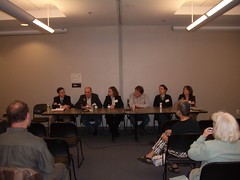
Have you seen
MsDewey.com? It's an odd, somewhat diverting "search engine," with terrible results, but featuring a funny—and hot, albeit scary-hot—actress who flirts with you, insults you and generally hams it up to the questions you give her. Play around, but ones like "Kiss me!," "How old are you?" and anything mentioning Bush have specific responses. The calculator to the right came out in order to insult my manhood!
Anyway, I'll eat my socks if this thing doesn't go down in a jiffy. Dewey is a registered trademark of OCLC, and trademarks—unlike patents and copyrights—must be
actively defended if they are to remain valid. If OCLC doesn't act, the Dewey Decimal System* could end up like the "elevator" trademark. Notably, OCLC sued the
Library Hotel (
OCLC Press Release), for daring to decorate and number its rooms by Dewey,
citing the need for trademarks to be "vigorously defended." After a public-relations debacle—OCLC
sued them for three-times profits!—the parties settled.**
From a WhoIs search it appears the site as put together by San Francisco-based
EVB. Searching some more, I
discover that Microsoft has confessed to sponsoring the site, writing:
"Who says search can’t be fun? At Windows Live we are constantly exploring new and creative ways to promote our search offering and deliver relevant information in an interesting and engaging way. The Ms. Dewey website is just one example of these efforts."
I'm AMAZED Microsoft would make a legal blunder like this. And if OCLC approved it, there'd be a ® symbol somewhere, don't you think?
*I object on principle to the trademark, and to the IP issues generally. Melvil Dewey died in 1931. The core of the system long since passed into the public domain everywhere. You want more bitching? See
here.
**Their press release quotes the hotel as saying:
“We do not believe that our use of the Dewey® trademarks in our beautiful boutique hotel near the New York Public Library infringes OCLC's Dewey® trademarks. ... But acknowledging OCLC's Dewey® trademarks and making a charitable contribution to promote reading by children, rather than spending money litigating, seems to be a reasonable way to resolve this matter.”
Considering that everyone says that you only need to use the ® symbol once, having them use it three times in a row looks a tad
forced.
 TechCruch breaks the news: Reddit has been acquired by Condé Nast. Reddit is a community-driven news and what's-cool site—something like Digg, but better. (For starters, Reddit hasn't hyped up an untrue story about one of LibraryThing's competitors!) I've followed them for some time, ever since meeting the founders at a Paul Graham/Y Combinator event in Cambridge. I'm pleased good things happen to good people.*
TechCruch breaks the news: Reddit has been acquired by Condé Nast. Reddit is a community-driven news and what's-cool site—something like Digg, but better. (For starters, Reddit hasn't hyped up an untrue story about one of LibraryThing's competitors!) I've followed them for some time, ever since meeting the founders at a Paul Graham/Y Combinator event in Cambridge. I'm pleased good things happen to good people.* Tim and I were at Tufts a couple of weeks ago for NEASIS&T's "
Tim and I were at Tufts a couple of weeks ago for NEASIS&T's " In other belated news, LT made it into October's issue of School Library Journal. In the article, "
In other belated news, LT made it into October's issue of School Library Journal. In the article, " Have you seen
Have you seen  The brilliant, eclectic French writer
The brilliant, eclectic French writer